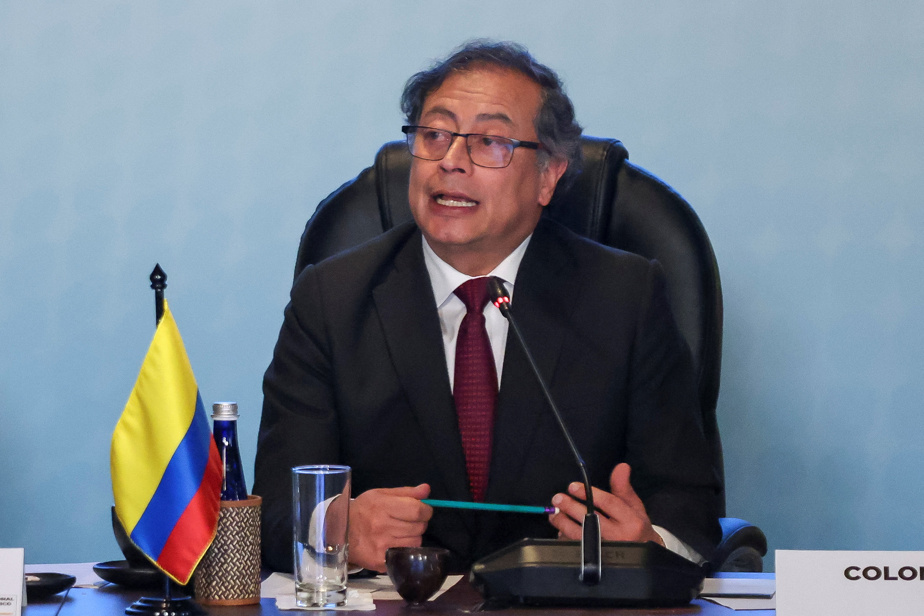(Bogotá) Colombian President Gustavo Petro announced Wednesday the replacement of seven of his ministers, after opposition to several reform projects by members of his government coalition.
Today a new cabinet is being built that will help consolidate the government’s program, “said an official statement from the Head of State.
Mr. Petro notably replaced the Minister of the Interior, that of Finance and the highly contested Minister of Health.
His program, on which he was elected in the summer of 2022, provided “a roadmap to bring about the change in favor of which millions of Colombians and Colombians voted”, he explains.
Despite “a commitment to dialogue”, with a government coalition open to the center and the moderate right, this “pact was rejected by some mainstream and establishment politicians”, charged Petro.
“We will persist in our program and our vocation for great national agreements,” promises Mr. Petro.
In power since August 7, Gustavo Petro – elected on the promise of “change” – is trying with difficulty to pass several bills, in particular in recent weeks a contested reform of the health system that has undermined his governing coalition with the centrists and the moderate right.
“Despite the majority vote at the polls calling for change in Colombia, the government is trying to stifle it with threats and bigotry. Such a situation leads us to rethink the government,” he castigated.
The political crisis has been brewing for several weeks, with this health reform as a catalyst. The Liberal Party, the Conservative Party and the U (Centrist) Party – all three members of the government coalition – once again opposed the bill head-on on Tuesday, threatening to expel all parliamentarians from their ranks. who would vote for it.
The same day, Congress redacted in committee another piece of legislation on the very sensitive subject of land redistribution and agrarian reform, again provoking the strong dissatisfaction of President Petro.
By mid-morning on Wednesday, none of the government ministers had officially tendered their resignation.
The first executive formed by the left-wing president was based on a coalition open to the center, the moderate right, and the academic world. The key portfolios of Defense, Interior, Finance or Foreign Affairs have thus been entrusted to personalities not from the “Historical Pact”, the left-wing alliance that brought Petro to power.
Since his arrival at the head of the country, he has had to face several resignations and he sacked three of his ministers at the end of February, including the centrist Alejandro Gaviria of the Education portfolio, very critical of the reform of health.
“First major political crisis in the government and within the coalition”, headlined Wednesday morning El Tiempo: “Petro radicalizes his speech, asks his cabinet to resign and declares the coalition dead”.
He has “sent some of the harshest messages against members of his own cabinet who have criticized his policies, against Congress, and against the mainstream political parties that have backed him since he took office in August,” the newspaper observes.
“Health reform: the project of discord that put an end to the government coalition”, also noted El Espectador, the other major daily of reference, evoking a very possible turn to the left for the next government.
A key politician and leader of the government coalition, Congress President Roy Barreras expressed concern that Petro’s statements could “generate an unprecedented crisis” in the country. “I don’t remember a president ‘declaring the death of his government coalition’ so prematurely,” he said.
“People have a lot of uncertainty about the future, the direction we are taking, and the changes of ministers only make this uncertainty worse,” the former president (2010-2018) warned on local radio. and Nobel Peace Prize laureate Juan Manuel Santos, whose commentary on the country’s internal political situation is rare.
On February 15, Gustavo Petro called on his supporters to take to the streets in support of his reforms. From the balcony of the presidential palace, the Casa de Nariño, he warned that he would continue to call for protests until “change” becomes a reality.
Besides the failure of several of his bills in Congress, Mr. Petro is struggling to implement his ambitious “total peace” plan to end the armed conflict in the country.
As mayor of Bogota (2012-2015), he had to face constant changes within his team, due to resignations or his own decisions.

